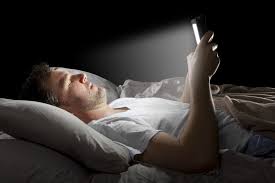(单词翻译:单击)
Any kind of light past bedtime -- from a gap in the curtains to a flash of your smartphone -- could pave the way to depression, new research warns.
新研究警告称,睡眠时任何种类的光线--无论是从窗帘缝隙透出的光,还是智能手机的闪光--都可能为罹患抑郁症创造条件。
Researchers found even the smallest hint of light exposure in the bedroom during the night could cause depressive symptoms by confusing your body clock.
研究人员发现,夜间卧室里哪怕一丝光亮,都可能通过干扰你的生物钟而造成抑郁症状。
Previous studies have linked nocturnal light exposure to a disruption in the body's sleep-wake cycle, but have struggled to explain how this impacts depression.
先前的研究在夜晚卧室光线和身体的睡眠-觉醒周期受干扰之间找到了关联,但科学家一直未能很好解释这如何影响抑郁症风险。
While the new study by researchers at Nara Medical University does not solve the mystery, it provides some of the clearest evidence to date that the link is stronger than most realize.
虽然日本奈良县立医科大学的研究人员进行的这项新研究没有解开这个谜题,但它提供的一些迄今为止最明确的证据表明,有关联系比大多数人意识到的要强。

Researchers led by Dr Kenji Obayashi recruited 863 elderly adults, with the average age of 72 years, who did not have depressive symptoms -- anxiety or a persistent feeling of sadness -- at the start of the two-year study.
由大林贤史博士领导的研究人员,共招募了863名平均年龄为72岁的老年人。在这一为期两年的研究的初期,这些老人并没有抑郁症状--焦虑或长期的悲伤感。
They measured light levels in their room by placing light meters at the heads of everyone's bed to determine the amount of light their subjects would see while going to sleep.
研究人员测量了这些老人房间的光线水平。他们将测量仪器放在每个人的床头,以判断老人入睡时会看到的光量。
About 710 participants slept in a completely dark room, while the rest of the subjects were exposed to light at night.
大约710人睡在完全黑暗的房间内,而其余的人在夜间会暴露于光线下。
The participants were also asked to keep sleep diaries and completed surveys that monitored the development of depressive symptoms.
研究人员还要求这些老人记睡眠日记,并完成一些调查,以监视他们抑郁症状的发展。
Researchers found that compared to the dark group, people exposed to more than 5 lumens of light at night had a significantly higher risk of developing depressive symptoms.
研究人员发现,同黑暗组的人相比,晚上接触超过5勒克斯的人出现抑郁症状的风险要高得多。
This isn't the first study to link nocturnal light exposure to the mood disorder.
这不是第一个将夜间光照同情绪失调相联系的研究。
Research published in a 2009 issue of Behavioral Brain Research found mice that were put in a room that was lit 24 hours a day had more depressive symptoms than those that had a normal light-dark cycle.
2009年美国《行为大脑研究》杂志上发表的一项研究发现,相比生活在正常的光照-黑暗周期中的小鼠,被放在全天24小时明亮的房间内的小鼠存在更多的抑郁症状。


